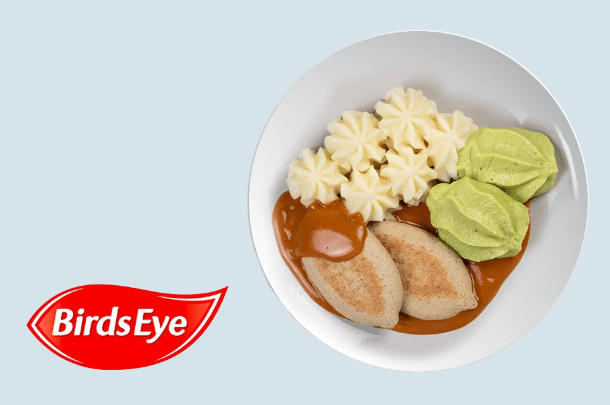This blog was prepared and written by Birds Eye and features as a guest blog on the Helping Hands Home Care website.
For individuals with swallowing difficulties, mealtimes can become less enjoyable and over time, this can have a negative impact on quality of life. The medical term for difficulty swallowing is dysphagia (‘dys’ being the Latin root for ‘hard, difficult or bad’, and ‘phagia’ meaning ‘to eat’).

There are a whole range of symptoms which can make eating and drinking challenging for individuals with dysphagia.
Symptoms of dysphagia include:
- Coughing or choking when eating or drinking
- Bringing food back up, sometimes through the nose
- A sensation that food is stuck in the throat or chest
- Persistent drooling of saliva
- Being unable to chew food properly
- A ‘gurgly’ wet sounding voice when eating or drinking
As a result of the challenges these symptoms create at mealtimes, it is unsurprising that weight loss is another symptom, as well as recurring chest infections from food particles accidentally being inhaled. It’s important to note that some people can have dysphagia without displaying symptoms.
There are many reasons as to why someone may develop difficulties with swallowing food.
Causes of dysphagia include:
- Conditions which affect the nervous system. For example: stroke, head injury, multiple sclerosis or dementia.
- Cancer (particularly cancers which affect the mouth and throat)
- Gastro-oesophageal reflux disease (GORD). This occurs when acid which normally sits in the stomach to aid digestion leaks back up into the oesophagus.
24% of older people also develop swallowing problems as a natural consequence of the ageing process.1
Treatment of dysphagia
Treatment of dysphagia is dependent on the cause and type of dysphagia the individual is experiencing. Many individuals with dysphagia are referred to a Speech and Language Therapist, who can undertake an assessment and make recommendations to increase the person’s comfort.
Some dietary recommendations for managing dysphagia include:
- Chewing food more thoroughly
- Avoiding tough and stringy foods
- Avoiding alcohol during mealtimes
Dysphagia is a serious medical condition and advice from a healthcare professional should always be sought on treating it appropriately.
Adopting a soft diet
A common intervention in the treatment of dysphagia is introducing a soft diet. Softer meals are easier to swallow and reduce the risk of choking, as well as helping to minimise a range of other dysphagia symptoms. It is crucial that a soft diet is provided without any compromise on nutritional content. Meals provided at the correct consistency, which are also nutritious, as well as tasty, can dramatically improve quality of life and make mealtimes an enjoyable experience once again. It is recommended that anyone having difficulties with swallowing should seek advice from a healthcare professional who will be able to conduct an individualised assessment.
What makes a diet balanced and healthy?
A healthy diet is one which provides the right amount of nutrients required by the body, such as fats, carbohydrates, vitamins and minerals. Adopting a healthy diet helps to promote daily and long-term health and vitality, as well as enabling individuals to maintain a healthy weight. Weight maintenance is achieved when energy intake (from our food and drink) matches energy expenditure (such as physical activity).
Healthy diets incorporate the right balance of macronutrients and micronutrients. Examples of macronutrients include carbohydrates, fat and protein. Examples of micronutrients include vitamins and minerals. It is also important to avoid excess salt in the diet, as this raises blood pressure and can increase the risk of developing cardiovascular disease.
Soft ready meals and drinks for people with swallowing or chewing difficulties

Alimento is a new brand combining over 140 years of scientifically based health and nutritional excellence with soft meals designed by Birds Eye for those with swallowing difficulties, and nutritious drinks from Ensure, the world’s number one nutritional supplement drinks brand.
Each of the Birds Eye Soft Meals (portioned for one typical full adult serving) are delivered frozen and can be microwaved at mealtimes, making it easy and convenient for carers to prepare. The range includes many different choices to suit individual tastes and preferences, and can be ordered as individual meals or as part of a set menu.

Ensure offers a selection of nourishing drinks which can be ideal for people who are nutritionally-compromised. Ensure drinks are intended for people who can safely consume normal fluids (i.e. not modified in consistency).
Ensure is available in a choice of delicious flavours and a range of formats. Ensure Compact is ideal for individuals who struggle with larger volumes of liquid. Ensure Max Protein provides high protein but low levels of fat and sugar, while Ensure Plus Advance is high in energy and protein, with added calcium and vitamin D. Ensure Compact and Ensure Plus Advance are foods for special medical purposes and should be used under medical supervision.
Try an Alimento taster pack today – now £5 (RRP £15) with free delivery. The taster pack includes two meals and two drinks. Register for your taster pack on the Alimento website.

Appetising food and drink, delivered to your home
Alimento meals are crafted by chefs and nutritionists, so they are full of vitamins and nutrients with no compromise on taste. Presentation is also key. The base of all the Birds Eye Soft Meals is a food puree, made from real ingredients full of nutritional value. These purees are mixed with egg, starches and spices, and then formed into timbales; named after a French cooking method of shaping food. The timbales are moulded to appear like regular meals, meaning people can enjoy their food in social settings without worrying about eating something different.
For added convenience, there is no need to leave the home to receive your Alimento meals and drinks as they can be reliably delivered directly to you. This is ideal for anyone self-isolating, social distancing, or simply anyone who may find it challenging to get out and about.

Browse the range
To find out more about Alimento and register to receive your taster pack, please visit www.alimento.co.uk.
1 – Chen PH, Golub JS, Hapner ER, Johns MM 3rd (2009) Prevalence of perceived dysphagia and quality-of-life impairment in a geriatric population. Dysphagia 24: 1-6.
